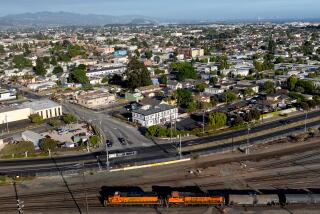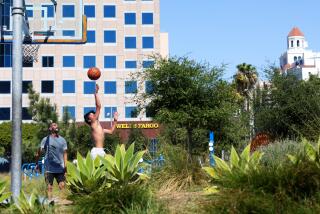War of Words Spells Trouble for Florida Paper : Media: The battle with a Cuban exile group has sparked threats and vandalism against the Miami Herald.
- Share via
MIAMI — Long-simmering differences between a powerful Cuban exile group and the Miami Herald newspaper have bubbled over into a bout of name-calling in the media that has apparently generated an outbreak of anonymous threats directed at newspaper executives.
David Lawrence Jr., publisher of the Herald, told the FBI and Miami police that late in January he and two top Cuban-born editors of the Herald had received unsigned death threats written in Spanish.
Herald vending machines have been vandalized with feces and glue, and some newspaper distributors have been intimidated and called “communists,” Lawrence said.
The threats follow a series of vitriolic public exchanges between Lawrence and Jorge Mas Canosa, chairman of the Cuban American National Foundation. Mas went on Spanish-language radio stations in January to denounce the Herald for its coverage of Cuban affairs. He suggested, according to the Herald, that the newspaper was a tool of the Fidel Castro regime.
Mas has accused the Herald of slanting coverage to favor Castro, pointing in particular to a Herald editorial critical of a Cuba trade bill sponsored by Rep. Robert G. Torricelli (D-N.J.) and to a column by the city editor of the Spanish-language El Nuevo Herald that castigated Cuban exile leaders who encouraged violence against the Castro government.
In a statement read over two Spanish-language radio stations, Mas called on the newspaper’s senior Cuban-born executives, Roberto Suarez, president of the Miami Herald Publishing Co., and Carlos Verdecia, editor of El Nuevo Herald, to resign as an expression of solidarity. They refused.
Since then, Lawrence has used his Sunday newspaper column to make personal appeals to Mas to “be fair.”
“You are a powerful person, here and in Washington, and you would like to hurt us, destroy us if you could,” Lawrence wrote. In a third column, he also said that while Mas and other critics may not have expressly encouraged violence, “when you make wild and angry accusations, like some of this ‘pro-Castro’ garbage, you stir up the less well-intentioned and the more misguided.”
Heightening tensions has been the formation of a Cuban Committee Against Defamation, which vowed to investigate the complaints against the Herald. Miami Mayor Xavier Suarez, who agreed to serve on the committee, said it was “a chronological coincidence” that the anti-defamation committee was formed in the midst of the controversy. Suarez said that although members of the Cuban American National Foundation serve on the committee, they do not control it.
“People are trying to put us on the defensive about this creation,” Suarez said. “I guarantee you this will not be the instrument of any one individual.”
At the same time, Suarez cited his own history of differences with the newspaper, and added: “One should wonder if (the Herald) is a newspaper at odds with the community. One of the most divisive forces in this community is the Miami Herald.”
Conflict between the Herald and segments of Miami’s multiethnic community are not new. But rarely have the complaints of any one faction of the community been given such broad exposure in the newspaper itself.
Many people seem to have taken sides. Francisco Aruca, a liberal Cuban radio commentator, says Mas’ attack on the Herald is an effort “to establish censorship, to control the trend toward free expression in Miami.”
On the other hand, Francisco Hernandez, president of the foundation, says membership has jumped by 1,200 and contributions are up $25,000 as a result of the controversy.
“It seems the Cuban people out there agree with what we are saying,” he said.
Since becoming publisher and chairman of the Herald in 1989, Lawrence has written a flattering column about Mas as a devoted family man, and the two have met and corresponded frequently.
But Mas went on Spanish-language radio in late January to compare the Herald to Cuba’s state-run newspaper, Granma, and he charged the Herald, the flagship paper of the Knight-Ridder Inc. chain, with practicing “intellectual terrorism.” He also said that Lawrence and Roberto Suarez “insult, misinform, distort, destroy men and institutions. . . .”
Mas, 51, is a millionaire businessman with strong connections to the Bush Administration. Known for his autocratic manner and temper (he once challenged a Miami politician to a duel), Mas is rumored to have ambitions to be president of a post-Castro Cuba, which he denies.
After two consecutive Sunday columns by Lawrence in rebuttal to Mas’ charges, the Herald permitted Mas to respond in a 4,000-word opinion piece last month. In the article, Mas enumerated a litany of complaints, citing what he called evidence of the Herald’s “campaign of advocacy journalism and political bias reflecting a marked insensitivity to the Cuban-American community.”
The foundation’s Hernandez said a boycott of the Herald has not been discussed. But, he added, “it is a possibility.”
Miami’s Changing Population
Miami’s growing population plays a strong role in business and politics. The Cuban community’s power in particular had grown immensley since 1959, when Fidel Castro’s takeover sparked a wave of immigration.
Dade County Population
1960 1970 1980 1990 Non-Latino Whites 80% 61.7% 47.8% 31.7% Non-Latino, Blacks and others 14.7% 14.9% 16.5% 19.1% Latino 5.3% 23.4% 35.7% 49.2% Total 935,000 1,268,000 1,626,000 1,937,000
The Herald’s Hold on the Market
* Daily circulation: 425,304
* Sunday circulation: 523,158
* El Nuevo Herald, published by the Miami Herald, is one of the largest Spanish-language dailies in the continental U.S., with a daily circulation of more than 99,000, and a Sunday circulation of 123,000.
* Population in the Herald’s primary market--Dade and Broward counties--exceeds 3 million.
Source: Knight-Ridder Inc.
More to Read
Sign up for Essential California
The most important California stories and recommendations in your inbox every morning.
You may occasionally receive promotional content from the Los Angeles Times.










